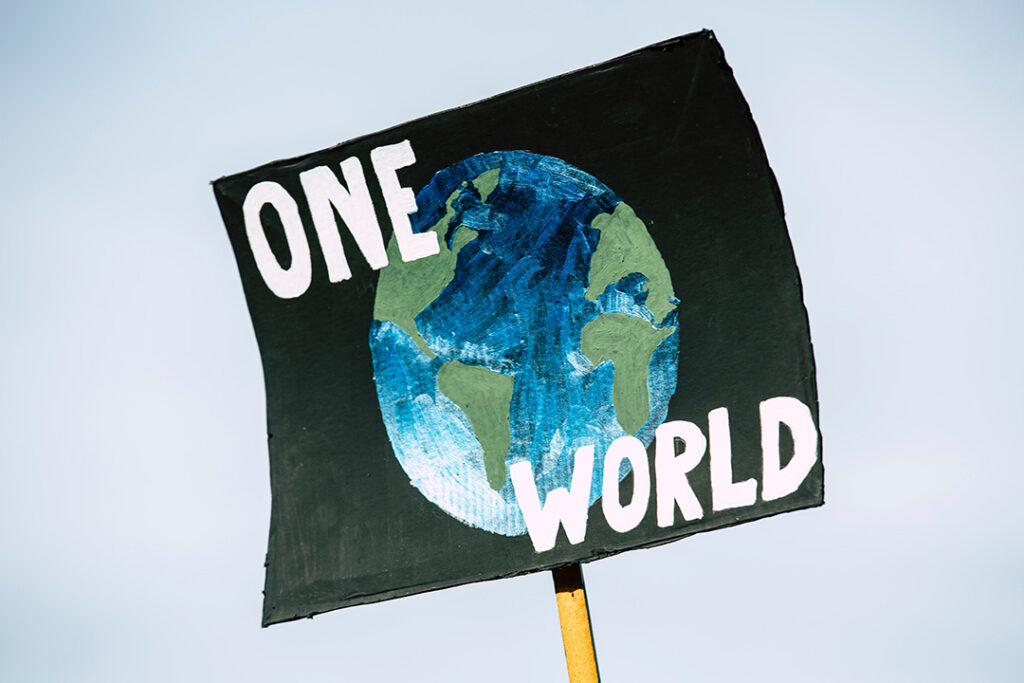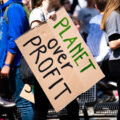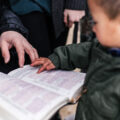Does religion lead to more sustainability?
Does religion lead to more sustainability?
Is nuclear power a solution for the climate crisis? According to some, the answer might be ‘yes’. But what role does religion play in this discussion on sustainability?
Religious motivation in the struggle for climate goals
The climate crisis is dangerous for all living beings on earth, not only for humans.[1] More and more people are not only aware of this danger, but also want to make a determined effort to protect the environment. Quite a few act in this regard out of religious motivation,[2] for example by wanting to preserve the divine creation from a Christian point of view.[3] [4] Thus, on October 4th 2022, Cardinal Secretary of State Pietro Parolin announced that the Holy See has acceded to the United Nations Framework Convention of Climate Change (UNFCCC) and the Paris Agreement.[5]
However, not only Christians but also people of different world views and denominations are uniting to work together for climate goals. For example, the initiative International Rebellion is a global action mobilised by Extinction Rebellion. It has inspired extraordinary unity across the globe by summoning people from New York City, London, and Berlin, all the way to Sydney, Jakarta, and Banjul.[6]
Ecological ethics
The continuing dependence on coal, gas, and oil is accelerating the climate crisis and the resulting consequences of global warming, air pollution, and extreme weather events.[7] In the fight against global warming, however, it is far from obvious how to find ways out of the crisis. From a religious perspective, too, this is an extremely complex phenomenon for which there are no simple solutions.[8]
This problem can be unfolded by looking at the issue of nuclear energy use. Can this be a sustainable solution? Some oppose nuclear energy because it can pose great dangers, and also brings the problem of nuclear waste disposal.[9] Others, however, favour the benefits of nuclear energy because it is largely clean and not nearly as damaging to the environment as, for example, fossil fuels.[10]
The example given around nuclear energy shows that climate change raises not only economic and political questions but also ethical and moral ones. For example, ecological ethics can be defined as a field of ethics that asks how people, institutions, and collectives should behave in a normatively correct and morally responsible way towards nature.[11] Of course, questions about ecological ethics are influenced by religious institutions and ethical questions are associated with beliefs.[12]
Ethics beyond religion: Greta Thunberg
But in pluralistic contemporary societies, moral and ethical identity is also fed from different sources. One can think here, for example, of the political sphere or the likewise very heterogeneous group of political activists who have a considerable influence on public opinion.[13] Greta Thunberg, for example, belongs to the latter group. Thunberg’s statement in 2019 that the debate on nuclear power should be stopped caused an uproar among the European public. According to Thunberg, talking about it is a waste of time as there were more important issues. Her subsequent statement that she was personally against nuclear power, but that it could actually be at least a small part of a large, new CO2-free energy solution, caused the same effect.[14] Thunberg has stuck to her opinion on the subject of nuclear energy. In October 2022, she reiterated to the German Stern magazine that in her opinion, it was currently worse to stop existing nuclear power plants if the alternative is to use coal.[15]
What is the particularity of religious perspectives?
On the other hand, the Protestant regional churches in the German states of Lower Saxony and Bremen are striving for an energy supply without nuclear power for their congregations. In the regions near the nuclear waste storage sites Asse and Gorleben, the church districts have been dispensing with nuclear power for two years. In Bremen, the central church administration uses only natural electricity.[16] In addition, the leaders of Catholic Action Austria (KAÖ) have criticised the European Commission’s announcement that it intends to categorise investments in nuclear power and gas as sustainable.[17] The Evangelical Church in Germany (EKD) expressed a similar view and wants to stick to the phase-out of nuclear energy. They believe the potential damage in the event of an accident is simply too great:[18] “Nuclear energy is not a responsible contribution to climate protection and hinders the necessary restructuring of energy supply. Above all, its risks – especially the unresolved final storage and the high damage potential – remain unresolved.”[19]
There is no such thing as “green nuclear power,” according to KAÖ. Certain initiatives, such as those of Extinction Rebellion, show that representatives of different religions or religious institutions can enter into dialogue and deal with issues of climate protection together. In order to understand the complexity of the overall issue of climate protection in general and the use of nuclear energy in particular, constant reflection and innovation is needed, for example by looking for new solutions.The special thing about the religious perspective here is that, in principle, economic goals are not in the foreground here. Religion considers issues such as preservation of creation, compassion and mercy towards non-human living beings, and more. Perhaps, religion could become a guide for politics and society on this hot topic.
You can use the free EARS Dashboard to learn more about trends and developments on the topic of religion and society. Hundreds of article summaries from all over the world were added in the past month!
Sources
[1] Die Klimakrise gefährdet unsere Gesundheit jetzt schon
[3] Klimawandel: Erstmals appellieren alle Weltreligionen gemeinsam
[4] Bekijk docufilm ‘The Letter’ met paus Franciscus over ecologie
[5] Vaticaan sluit zich aan bij klimaatverdragen
[6] RABBIS AND ROYALS, SCIENTISTS AND STUDENTS, CRUSTIES AND CONSERVATIONISTS: All take to the streets for an unprecedented International Rebellion to call for radical action on the climate crisis
[7] Die Klimakrise gefährdet unsere Gesundheit jetzt schon
[11] Die ethische Seite des Klimawandels
[12] Religion und Wirtschaftsethik
[13] Religiöse Moral und Politik
[14] Warum Greta Thunberg jetzt „Atomlobbyismus“ vorgeworfen wird
[15] Greta Thunberg wiederholt ihre Meinung zur Atomkraft – und bekommt plötzlich Applaus aus unerwarteter Ecke
[16] Energieversorgung ohne Atomkraft
[17] Katholische Aktion kritisiert Europäische Kommission
[18] Am Ausstieg aus der Kernenergie festhalten
[19] Ethische Bewertung der Kernenergie und der Ausstiegsoption






